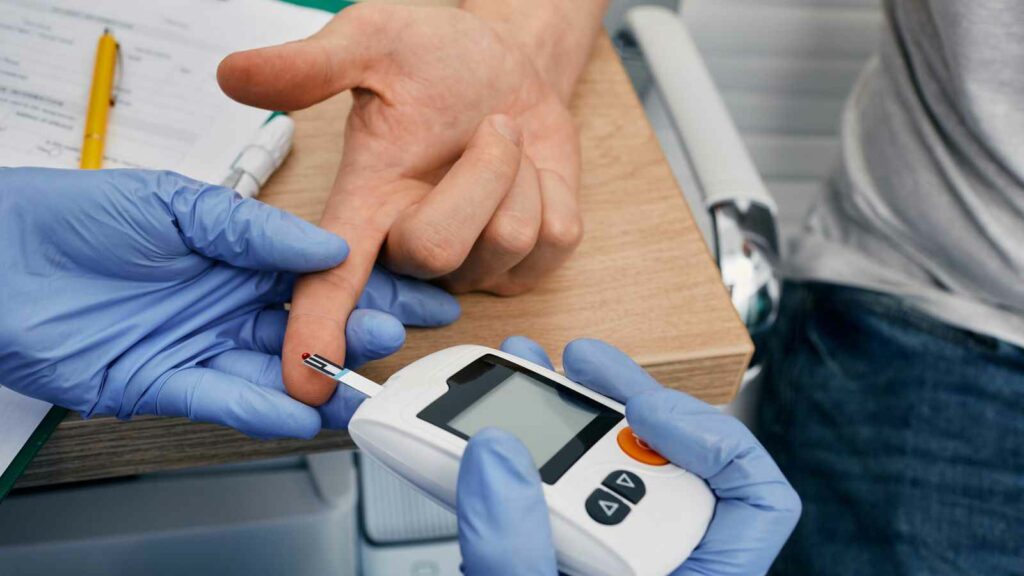Type 2 diabetes can be challenging, but there’s more to managing this condition than just medications. In recent years, a growing body of evidence has highlighted the effectiveness of non-pharmacological treatments in controlling blood sugar levels and improving overall well-being. In this blog, we’ll explore a range of non-pharmacological treatments for type 2 diabetes that can complement conventional medical treatments. By incorporating these strategies into your daily routine, you can take proactive steps towards better health and greater control over your diabetes.
Contents
What Are The Non-Pharmacological Treatments For Type 2 Diabetes?
 Non-pharmacological treatments for Type 2 diabetes primarily focus on lifestyle changes and holistic approaches to manage blood sugar levels. Here are some key non-pharmacological interventions:
Non-pharmacological treatments for Type 2 diabetes primarily focus on lifestyle changes and holistic approaches to manage blood sugar levels. Here are some key non-pharmacological interventions:
Dietary Changes
A balanced and nutritious diet is a cornerstone of managing Type 2 diabetes. Focus on incorporating various nutrient-dense foods into your meals, including fresh fruits, vegetables, whole grains, lean proteins, and healthy fats. Strive for a well-rounded plate to ensure a mix of carbohydrates, proteins, and fats. Paying attention to portion control is equally vital. Managing the quantity of food consumed helps regulate blood sugar levels and prevents overeating. Additionally, opting for foods with a low glycemic index (GI) can mitigate rapid spikes in blood sugar, as these foods are digested more slowly, providing a steadier release of glucose into the bloodstream.
Regular Exercise
Engaging in regular physical activity is a powerful non-pharmacological intervention for Type 2 diabetes. Aerobic exercises, such as walking, jogging, swimming, or cycling, help improve insulin sensitivity, allowing the body to use insulin more effectively. Furthermore, incorporating strength training exercises into your routine contributes to muscle development, which aids in better glucose utilization. Aim for at least 150 minutes of moderate-intensity aerobic activity per week, coupled with strength training exercises at least two days a week, under healthcare professionals’ guidance.
Stress Management
Chronic stress can adversely affect blood sugar levels in individuals with Type 2 diabetes. Implementing stress management techniques is crucial. Mindfulness practices, such as meditation and deep breathing exercises, can help alleviate stress and promote a sense of calm. Regular relaxation activities, such as reading, listening to music, or spending time in nature, contribute to an overall reduction in stress levels. Establishing a routine that includes these activities can have a positive impact on both mental well-being and glycemic control.
Adequate Sleep
Quality sleep is integral to overall health and plays a significant role in diabetes management. Lack of sleep can disrupt insulin sensitivity and glucose metabolism, leading to elevated blood sugar levels. Aim for 7-9 hours of uninterrupted sleep each night. Establishing a consistent sleep schedule, creating a relaxing bedtime routine, and ensuring a comfortable sleep environment are essential components of promoting adequate and restful sleep. Prioritizing good sleep hygiene contributes to overall diabetes care and well-being.
Hydration
Staying well-hydrated is a fundamental aspect of managing Type 2 diabetes. Water is essential for various bodily functions, including the regulation of blood sugar levels. Adequate hydration helps the kidneys function efficiently in removing excess glucose from the bloodstream through urine. Additionally, staying hydrated supports overall health and can contribute to a sense of well-being. Aim to drink at least eight 8-ounce glasses of water per day, and adjust your intake based on factors such as physical activity levels and climate.
Herbal Remedies
Some individuals with Type 2 diabetes explore herbal remedies and supplements to complement their treatment plans. Certain herbs and supplements, such as cinnamon, bitter melon, fenugreek, and aloe vera, have been studied for their potential benefits in glycemic control. However, it’s crucial to approach these with caution and under the guidance of healthcare professionals. The effects of herbal remedies can vary, and interactions with medications may occur.
Social Support
 The emotional aspects of living with Type 2 diabetes can be significant, and having a strong social support network is invaluable. Building connections with family, and friends, or participating in support groups allows for the sharing of experiences, encouragement, and advice. Emotional well-being is intertwined with physical health, and having a support system can positively impact stress levels, mental health, and overall diabetes management. Consider discussing your feelings and challenges with loved ones or seeking the guidance of mental health professionals when needed.
The emotional aspects of living with Type 2 diabetes can be significant, and having a strong social support network is invaluable. Building connections with family, and friends, or participating in support groups allows for the sharing of experiences, encouragement, and advice. Emotional well-being is intertwined with physical health, and having a support system can positively impact stress levels, mental health, and overall diabetes management. Consider discussing your feelings and challenges with loved ones or seeking the guidance of mental health professionals when needed.
Mind-Body Practices
Integrating mind-body practices into your routine can provide holistic benefits for both physical and mental health. Yoga and Tai Chi, for example, incorporate movement, breath control, and mindfulness, promoting relaxation and flexibility. These practices have been associated with improved insulin sensitivity and reduced stress. Experiment with various mind-body practices to find what resonates best with you and fits seamlessly into your lifestyle.
By adopting these non-pharmacological treatments for type 2 diabetes, individuals can take a proactive and holistic approach to their health. However, it’s essential to collaborate with healthcare professionals to ensure that these lifestyle changes align with individual health needs and are integrated into a comprehensive diabetes management plan.
What Are The Benefits Of It?
The non-pharmacological treatments for Type 2 diabetes offer a range of benefits that contribute to overall health and well-being. Here are some key advantages:
- Improved Blood Sugar Control: Dietary changes, regular exercise, and hydration play crucial roles in regulating blood sugar levels. These interventions help the body utilize insulin more effectively and prevent rapid spikes in glucose.
- Enhanced Insulin Sensitivity: Regular physical activity, particularly aerobic and strength training exercises, improves insulin sensitivity. This means the body can use insulin more efficiently, facilitating better glucose uptake by cells.
- Weight Management: Adopting a balanced diet and engaging in regular exercise can contribute to weight management. Maintaining a healthy weight is important for individuals with Type 2 diabetes, as excess weight can contribute to insulin resistance.
- Reduced Stress Levels: Stress management techniques, including mindfulness practices and relaxation activities, can help lower stress levels. Chronic stress can negatively impact blood sugar control, and mitigating stress is beneficial for overall health.
- Better Sleep Quality: Establishing healthy sleep patterns contributes to improved diabetes management. Quality sleep supports overall well-being and can positively influence insulin sensitivity and glucose metabolism.
- Emotional Well-being: Social support and engagement in mind-body practices contribute to emotional well-being. Having a strong support network and addressing the emotional aspects of living with diabetes can positively impact mental health.
- Holistic Health Benefits: Herbal remedies, when used cautiously and under professional guidance, may provide additional support for glycemic control. Some herbs are believed to have anti-inflammatory and antioxidant properties.
- Cost-Effective Approach: Non-pharmacological treatments often offer a cost-effective approach to diabetes management. Lifestyle changes, such as dietary modifications and exercise, can be sustainable and have long-term benefits without the ongoing costs associated with medications.
It’s important to note that while these benefits are significant, individual responses to non-pharmacological treatments may vary. So, you should always consult with healthcare providers to tailor a plan that meets individual needs and addresses specific health concerns.
What Are The Risks With Non-Pharmacological Treatments For Type 2 Diabetes?
 While there are various benefits, it’s essential to be aware of potential risks and challenges associated with these approaches. Here are some considerations:
While there are various benefits, it’s essential to be aware of potential risks and challenges associated with these approaches. Here are some considerations:
Individual Variability
Responses to lifestyle changes can vary widely among individuals. What works well for one person may not be as effective for another. It’s crucial to tailor non-pharmacological treatments to individual needs and monitor their impact on blood sugar levels.
Need for Personalization
Non-pharmacological treatments should be personalized to the individual’s health status, preferences, and lifestyle. Failing to customize the approach may result in challenges with adherence and effectiveness.
Potential for Hypoglycemia
Introducing significant dietary changes, combined with medication adjustments, may increase the risk of hypoglycemia (low blood sugar). It’s essential to monitor blood sugar levels regularly and coordinate any changes with healthcare professionals to prevent adverse events.
Interaction with Medications
Some herbal remedies and supplements may interact with prescribed medications, affecting their efficacy or leading to unintended side effects. Always consult with healthcare providers before incorporating any herbal or alternative therapies into your diabetes management plan.
Inadequate Glycemic Control
Depending solely on non-pharmacological treatments may not provide sufficient glycemic control for some individuals. In certain cases, medications may be necessary to achieve target blood sugar levels and prevent complications.
Challenges in Adherence
Adhering to lifestyle changes can be challenging for some individuals due to various factors such as time constraints, personal preferences, or lack of social support. Establishing realistic goals and creating a supportive environment are crucial for long-term adherence.
Risk of Overreliance on Herbal Remedies
Relying solely on herbal remedies without proper guidance can pose risks. Some herbs may have contraindications or side effects, and their effectiveness is not universally established. Consult healthcare providers to ensure the safety and appropriateness of herbal supplements.
Social and Emotional Impact
Diabetes management involves emotional and social aspects. Non-pharmacological treatments may require significant lifestyle adjustments, potentially impacting social activities and emotional well-being. Support from healthcare professionals and a strong social network are crucial in addressing these challenges.
It’s essential to approach non-pharmacological treatments for Type 2 diabetes with a comprehensive understanding of individual needs, potential risks, and the collaboration of healthcare professionals. A balanced and personalized approach is often the most effective strategy for managing Type 2 diabetes.
Conclusion
In conclusion, the non-pharmacological treatments for type 2 diabetes explored in this comprehensive blog present a multifaceted approach. The integration of a balanced and nutrient-dense diet, regular physical activity, stress management techniques, adequate sleep, and hydration offers a holistic framework for enhancing blood sugar control and overall well-being. While these lifestyle changes exhibit significant benefits, it is paramount to recognize individual variability, potential risks, and the need for personalized interventions.
Hence, the risks emphasize the importance of collaboration between patients and healthcare providers. Overal, the judicious combination of lifestyle modifications with medical interventions remains pivotal for achieving optimal outcomes in Type 2 diabetes management.
Do you want to get rid of diabetes? Join our online diabetes treatment program and reverse Diabetes naturally through lifestyle changes such as a Personalized Diet plan, Exercise, Yoga, dieticians, and health coaches.

